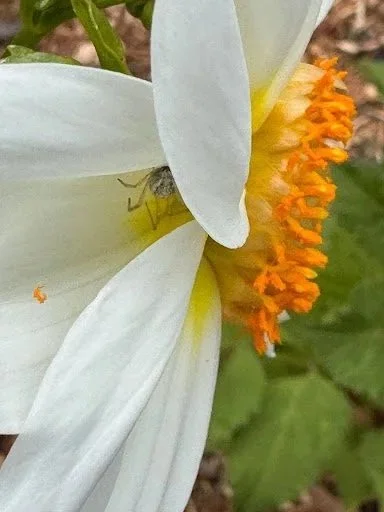NOTICINGS: Precarity
Kung Fu gardening is not only a metaphor
It’s kung fu garden season. Like the Karate Kid, I swat and swat again at spider webs this way and that with a ferocity born of spider bites. My system reacts, and each bite results in itching that goes to town at night for weeks. When first-time visitors come through the garden gate, they often murmur, “Oh, it’s a sanctuary.” Not for me at summer’s end. Instead of calm, I am wary, alert, as ready to strike out as dry tinder is ready to burst into flame.
Still. Nevertheless. The orb spider’s clear, colored spiral web is cause for ever-renewed awe. The eight-legged architect's unceasing attention is cause for marvel. Until you walk into the silk weaver’s beauty. Sticky!
Yesterday, intent on carefully lifting a spider with a dried daylily stalk because its cobweb was smack in the middle of where my face would have been, the spider landed on me. My history of itch misery swung into action. I stepped on the spider. Instantly, I felt awful.
The next day I listened to Bayo Akomolafe speak about “making a sanctuary.” A globally recognized academic, he spoke about precarity that has unnerved us all.
Precarius. From the Latin root Precarius, the meanings have shifted, making the word itself an explosive force, like the sound of an arrow released from a bow. Across the arc of time beginning in the first century BCE, precarity was a favor obtained by entreaty.
Onwards to the 11th-14th centuries, precarity was a revocable condition of feudal law for land tenure. Broadened in the 1600s, precarity meant an overall instability or insecurity.
Today, in our 21st century, precarity lands with an algorithmic grip that expands not just the risk of revocable favors, but chronic exposure to uncertainty. The easily recognizable condition of people—immigrants, gig workers, refugees, marginalized groups—live with instability built into the rules of the way things are done.
Precarity now. “The three delusions of modernity are that we are stable, we’re found, and we're coherent,” Akomolafe says. “Modernity has a story, a myth that we are all safe.”
America’s current government is governing on the basis of revocable favors. We stand not on constitutional rights or on terra firma. Are we headed for favor by entreaty? We stand in a quagmire. For each of those categories — plague, climate, and technologies — political binaries are obviously in pitched battle. I am more frightened by humans making precarity happen, like my slippered foot on the spider, than the collapse of the Cascadia Subduction Zone on which I and everyone else on the coasts of British Columbia, Washington, Oregon, and Northern California live.
Akomolafe encourages us to sit, pause, and hold our experience of precarity. An image of holding a newborn comes to mind. A sense of tenderness and the strangeness of the new, unknown, suffuses my entire being as I write that sentence. By holding opposite tensions, Akomolafe says, a “different freedom” may emerge. Opposites might find a way out of dead-end battles. He calls it a third way.
Carl Jung also talks about a third way. Jung said that when you’re pulled in two absolutely impossible choices, do not pick one. Pause. Hold both. Without denying either, the psyche can generate a third thing beyond the opposites. Jung describes the third way as a “natural process, a manifestation of the energy that springs from the tension of opposites.” The work of reconciling or integrating opposites is not just metaphorical, but central to how transformation happens.
The possibility of a third way is not just for individuals. For instance, not just for me, myself, who contends with opposites. Or, just for you. Jung believed that holding the tension of opposites applies to the “collective consciousness” of whole societies. It’s not just me, it’s our entire country caught in this web of tension.
On the front porch this morning, I saw a vigorous, rapid, up-and-down blur of motion. In mid-air! Then it stopped. Then I saw an orb spider. What was it doing?!
I do not know enough about this creature. Yet after reading a bit about the spider family Araneidae, I learned that I got the source of the spider bites wrong. I don’t suffer from orb spider bites. The bites might be from grass spiders.
The connection I made between my orb kill and precarity was so spontaneous that I sat down to register what had just happened in my head. Jung wrote about pausing. Akomolafe speaks about holding. The goal is not to eliminate one side or the other, or to compromise. By sitting in the sanctuary of one’s own making, the third way opens through the cracks of binaries, the space between and beyond, where new ways of relating, knowing, and becoming can unfold.
Our resilience in this time of riven precarities could be no less than that of the orb spiders who preceded homo sapiens by 10,000 years.
Thank you for reading Noticings. This post is free and public, so please share it with your friends and family!
Notes:
Bayo Akomolafe | Let Us Make Sanctuary
https://www.bayoakomolafe.net/
Carl Jung, Psychological Types, CW Vol. 6, §78 (“The Problem of the ‘Attitude-Type’” / “The Spark of Opposites and Transformations of Energy”



